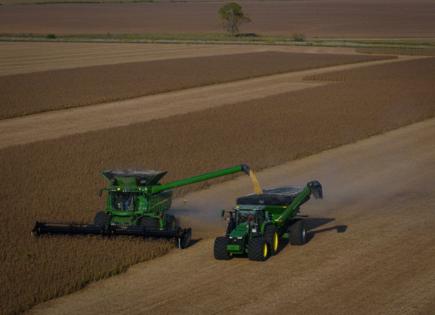Editorial: Trump has done plenty for Illinois farm country. But are there storms ahead?
Published in Political News
Illinois farmers are busy these days planting corn and soybeans and keeping a watchful eye on storms blowing in — from Washington, D.C.
President Donald Trump’s trade wars have sidelined China and discouraged other important customers of American agriculture, setting the Grain Belt on edge.
At the same time, cutbacks at the U.S. Department of Agriculture have disrupted long-standing programs, which has complicated spring planting. Plus, a potentially bitter battle looms over reauthorizing the 2018 Farm Bill that expired in 2023.
Despite the uneasy times, farm country has reason to expect a financial rebound this year. Unlike many other independent businesses hurt by tariff battles, government layoffs and unpredictable policy changes, the agricultural sector — especially corn and soybean producers — stands to benefit from an increase in taxpayer-funded subsidies.
In late December, even before Trump took office, Congress approved legislation that provides $10 billion in economic assistance for farmers, which was intended to make up for low crop prices and high input costs. Billions more were allocated for losses from natural disasters.
Earlier this year, the USDA predicted that net farm income, a broad measure of profits, would shoot up more than 30%. That would help to push household income on the average farm to more than $100,000, while large producers would make many times that amount.
The biggest swing factor by far is direct government payments, which the USDA has pegged at $42.4 billion for 2025, up an astonishing 355% from last year. And here’s the kicker: Those USDA estimates from early February don’t yet account for the fat checks a Trump-controlled Congress could very well dole out in the future to compensate farmers for the trade war’s impact.
Federal agricultural policy continues to reflect the political leverage of favored constituencies. For others left without similar support, the costs of trade disruptions often fall harder and without relief.
We’ve seen this movie before: During Trump’s first presidency, the administration championed a series of bailouts for farmers hurt by trade battles with China and other key export customers.
Aid for agriculture jumped by tens of billions from 2018 through 2020, a level of support that some in the industry referred to as “Trump money.” Thousands of operators got more than $100,000 each.
Who can blame them for demanding more of the same in 2025? Trump has already adapted his policies to accommodate Big Tech, automakers and other clout-heavy industries, and farmers strongly backed the president in the 2024 election.
Contrary to the evidence, Trump has promised they’ll have a “field day” selling their crops domestically this year. He has also told them to expect “a little bit of an adjustment period,” with the implication that Uncle Sam’s checkbook is wide open to lessen the sting.
Most other small-business owners, lacking comparable political clout, have seen far less federal support in response to the same economic headwinds. While large companies typically have the advantage of substantial cash cushions and the market power to negotiate prices with suppliers, small-time entrepreneurs are mostly stuck absorbing the damage, scrambling to cut costs and putting expansion plans on hold.
No wonder economic forecasters say the arrow is pointing down for economic growth and up — again — for inflation.
Still, small-business operators whom Trump has left to fend for themselves shouldn’t feel too jealous of their brethren on the farm. Even if Trump were to back off today from the tariffs he has chaotically imposed, the administration’s trade wars stand to do lasting damage to American agriculture. Over time, that’s likely to translate into lower incomes than U.S. farmers enjoyed for many years under pro-free-trade regimes.
During Trump’s first term, China turned to South America for soybeans it otherwise would have purchased from North America. Brazil, especially, expanded its planted acreage in response, and the U.S. never fully recovered those lost sales. The European Union, Japan, Canada and other big customers of American grain and oilseeds also are seeking to shift their purchases to more reliable suppliers.
Beyond trade, U.S. farmers worry about Trump’s efforts to deport agricultural laborers. Mass deportations would raise costs and potentially disrupt food supplies. Agricultural research is under siege as well. The Trump administration is especially keen to target anything connected to climate change, which many farmers know firsthand is not only real, but potentially an existential threat to their operations.
Support in the rural heartland reportedly remains solid for Trump and his goal of busting up global trade, which the president contends is unfair to America. That support will continue, we expect, as long as government funds keep rolling in at massive levels.
As for everyday taxpayers, get ready to treat yourselves to a big bushel of No. 2 yellow corn. With so many of America’s traditional trade partners backing away, there should be plenty of Illinois grain available around harvest time.
_____
©2025 Chicago Tribune. Visit chicagotribune.com. Distributed by Tribune Content Agency, LLC.




























































Comments